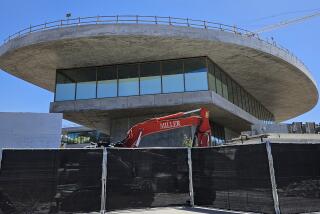The Line Is Thin--Too Thin
- Share via
The plan by the Simon Wiesenthal Center for Holocaust Studies to build a $20-million Museumof Tolerance in West Los Angeles is commendable and should result in an important addition to the world’s knowledge of genocide, one of the horrors of the 20th Century. But the California Legislature should not contribute $5 million of public money to a project sponsored by a religious institution.
Until recently the Wiesenthal Center was part of Yeshiva University of Los Angeles. While it has now incorporated as a separate organization, it continues to have the same board of trustees as Yeshiva University, and it is headed by the same person, Rabbi Marvin Hier. There is no arm’s-length separation between the two organizations, and it is fair to conclude that for all practical purposes they remain closely bound. Too closely bound to receive a state grant.
The Wiesenthal Center’s plan presents an awkward problem for the rest of the Jewish community. There are internal politics and rivalries, but there is also the substantive issue of the separation of church and state. For the most part, Jewish leaders have been reluctant to speak out against a public contribution to the Museum of Tolerance, though many are uncomfortable with it. Rabbi Alfred Wolf of the Wilshire Boulevard Temple said that, while he supports the museum’s goals, he is “wary of anything which might be interpreted as a breach of the separation of church and state such as the support of a purely religious project by public funds. It appears to me that the line is a very thin line separating the proposed museum from something that is denominationally religious.”
Nonetheless, in March the state Senate approved the proposed contribution by 36 to 1, and the measure is now working its way through Assembly committees. To make the museum more universal and to broaden its political appeal, it is to include an exhibition on the World War I slaughter of Armenians by Turks, and it may also include material on the killing of millions of Cambodians by the Pol Pot regime.
Unfortunately, there has been no shortage of holocausts to memorialize. Each generation needs to be reminded of what can happen when madmen seize political control. The stark evidence must be readily available to counter those who contend that such things never happened and that the Nazis, in particular, were not guilty of their ghastly deeds. But the Wiesenthal museum can be built without public money, and it should be.
More to Read
Sign up for Essential California
The most important California stories and recommendations in your inbox every morning.
You may occasionally receive promotional content from the Los Angeles Times.













